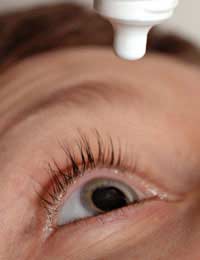Treating Glaucoma

Many people who are diagnosed with an eye condition such as glaucoma, fear that they will lose their sight completely. However if the condition is caught early enough there are several treatments which can be used to minimise any potential sight loss.
Treatments are effective when the condition has been detected in the early stages. All treatments reduce the pressure in the eye and can consist of eye drop tablets, laser treatment or surgery. Some treatments help to improve the blood supply to the optic nerve.
If you have glaucoma you will have to go to the hospital eye clinic for treatment and have regular check-ups with the ophthalmologist (specialist eye doctor.) Depending on how serious the glaucoma is you may be able to see your optician for check-ups. In some parts of the country you may be able to have your condition monitored by your local optician. When you are first diagnosed you will be told where to go for treatment and follow-up checks.
Chronic Glaucoma
Chronic glaucoma is one of the main types of the condition. For chronic glaucoma eye drops are usually prescribed to begin with. The drops will reduce the amount of liquid in the eye and improve drainage. It is imperative that patients continue to use the eye drops every day even if their vision seems good. A patient’s sight may appear normal but it could be getting worse without them noticing. According to the RNIB many patients with glaucoma often stop taking the eye drops because they believe the glaucoma is under control. However if a patient doesn’t continue to use the eye drops as prescribed their sight may become gradually worse and they could lose their sight.If the drops do not work sufficiently then your ophthalmologist may suggest laser treatment or a surgical procedure called a trabeculectomy which will improve the drainage of fluid around the eye.
Acute Glaucoma
Many people experience a series of mild attacks where their vision seems misty with coloured rings around white lights. A severe attack can be very painful, your sight will deteriorate and you could even black out. Whether you have several mild attacks or a sudden acute attack you will need to go to the hospital straight away. Drugs will be given to reduce the pain and pressure. If treated early, an acute attack can be brought under control and your sight will begin to return. Laser treatment or minor surgery will be needed but is not painful. It involves making a small hole in the outer border of the iris (the coloured part of the eye) to relieve the blockage and allow the fluid to drain away. The ophthalmologist may advise treatment in the other eye to prevent the condition developing in both eyes.Eye Tests
If you or a family member has glaucoma, it is important to have regular eye tests. Eye tests are not only important to detect the condition early, but to ensure the condition is controlled once it is diagnosed. The optician will be able to monitor the disease and ensure a persons vision is not deteriorating any further. Annual eye tests are available on the NHS for those with glaucoma and also for those who are aged over 40 and have a close family member with the condition - that is a mother, father, sister or brother.- What is Allergic Conjunctivitis
- What Does Uveitis Mean?
- What is Retinal Vein Occlusion, RVO
- My Lazy Eye Got Me Bulllied at School
- Iritis Explained
- Squint Repair
- Amblyopia or Lazy Eye
- Blepharitis
- Chalazion or Lump on Eyelid
- Styes
- What is Age Related Macular Degeneration?
- Treating Cataracts
- Short Sightedness
- Treating Age Related Macular Degeneration
- Diabetic Retinopathy
- Long Sightedness
- Astigmatism
- What are Cataracts?
- Detached Retina
- What is Glaucoma?


Re: Is There an Operation for 'Lazy Eye'?
written on the parchment was scratched out
Re: What is Vitrectomy Surgery?
I had vitrectomy 4 weeks ago. The surgery was not well done as apparently bleeding occurred. The hole did not close despite having…
Re: Glasses or Contacts?
I need a eye exam and new glasses it's been since 2013/ I have no income I lost my boyfriend last September and I've been homeless ever…
Re: Eyewear for the Partially Sighted
This extract from your text is not clear and the grammar is poor- and the letters in the validation box are mixed…
Re: Eye Cancer Symptoms
I have yellow in both eyes lools like 2 dots. But looks like its makin the white part of my eye yellow whats wrong with me
Re: Are my Glasses Affecting my Eyes?
Hi, Please can anyone give advice on wearing varifocals. After a short while I develop a severe ache in my left eye and…
Re: Are my Glasses Affecting my Eyes?
On wearing my new varifocals, I am finding that my left eyeball hurts so much it feels like it will explode after 15…
Re: What is the Cause of my Itchy Eye?
I have One and only One itchy eye that has been going on 24/7 for 5 weeks.Eye is not swollen vision not affected. Eye doc…
Re: Contact Lens Trials Explained
Hi, We wanted to get in touch with you to increase traffic on your website. Please reply to this email so we can send you free…
Re: What Are Photoreceptors?
I have a 10 year old grandson who was diagnosed at apx 2 with cone and rod dystrophy eye disease. Please help with any treatment…